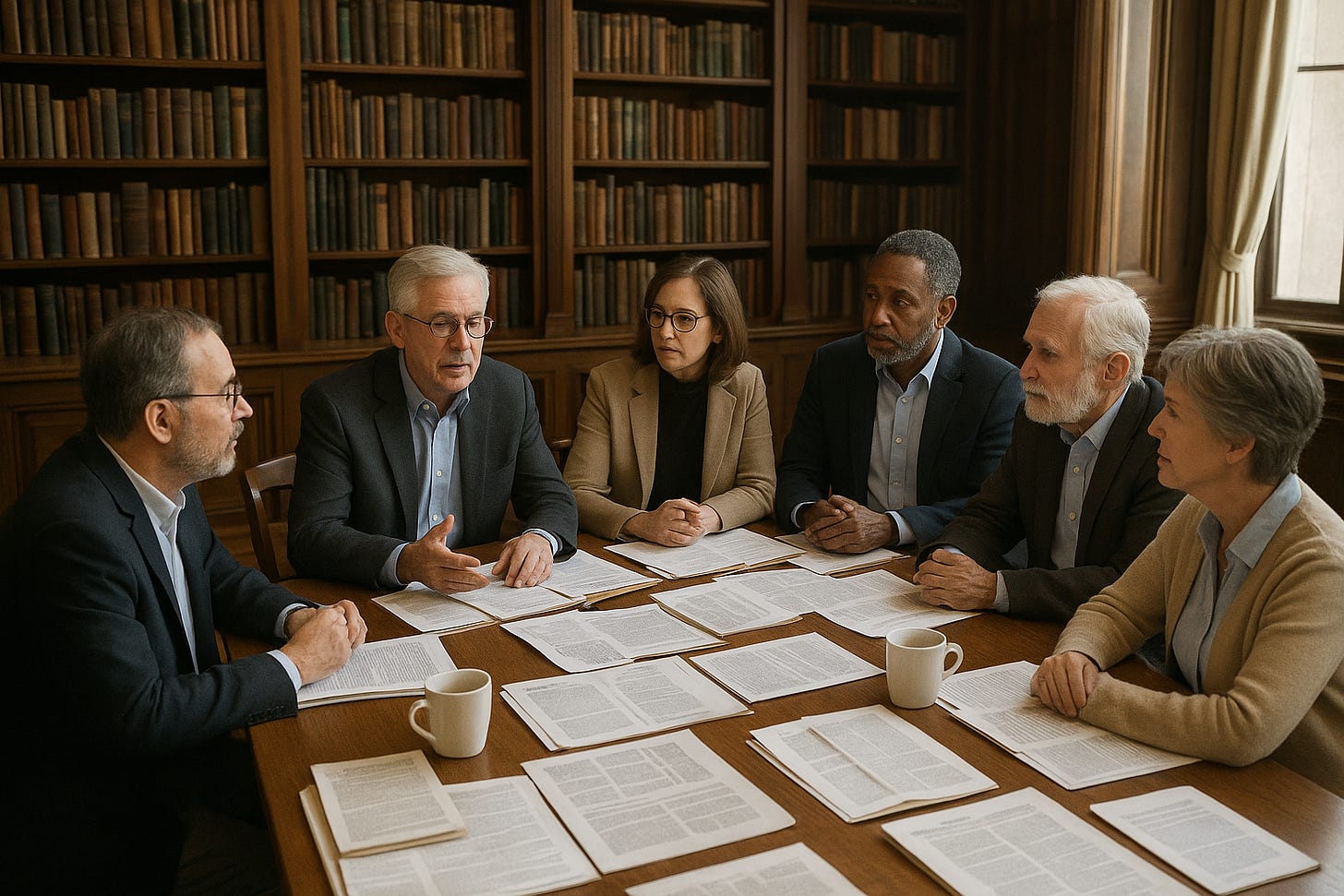Setting: Clara’s townhouse, salon-style evening. Coffee cups steam, rain patters softly outside.
Characters:
Adrian – Philosopher, Socratic guide.
Ben - Lawyer sharp on international law and precedent.
Clara – Host, ex-EU aide.
Eloise - activist, moral idealist, and impatient with detail.
Rafi – Gazan-born engineer, anti-Hamas, anti-corruption.
Hale – Professor of International Law, measured and precise.
Recognition Raised
Eloise: “Spain, Norway, Ireland, Slovenia—they’ve recognized Palestine. More will follow. Recognition is overdue, the moral spark that could ignite peace.”
Clara: “Or ignite something else. Adrian?”
Adrian: “Recognition of what? Hamas’s Gaza? Abbas’s Authority? Undefined borders? No constitution? No monopoly of force? If recognition were a substitute for peace, history would have proved it long ago.”
The Historical Ledger Emerges
Ben: “Eloise, history matters. Let’s trace it. Every peace or partition plan since 1919—Zionists accepted or compromised; Arabs rejected or chose war.”
Hale: “The record is stark. Faisal–Weizmann (1919): Zionists agreed to cooperation. Faisal signed, then reversed under Arab League pressure. Churchill White Paper (1922): Jews opposed limits; Arabs insisted on exclusion east of Jordan. Peel Partition (1937): Zionists reluctantly accepted a tiny state; Arabs rejected it outright.”
Adrian: “During the Holocaust, Britain’s 1939 White Paper cut immigration. Zionists cried betrayal; Arab leaders endorsed it. In 1947, the UN Partition Plan was embraced by Jews but rejected by the Arab League, which declared war. Five Arab armies invaded. The Arab ‘No’ became blood.”
Rafi: “And 1949? Israel signed armistices. Arab states refused recognition. Borders were to be erased later by victory.”
Hale: “1967, after Israel’s defensive war: UN Resolution 242 promised land for peace. Israel accepted. The Arab League at Khartoum responded: No peace, no recognition, no negotiations. The famous ‘Three No’s.’”
Ben: “1978, Camp David: Israel returned Sinai and recognized Egypt. The Arab League expelled Egypt for daring to sign. Oslo, 1993: Israel recognized the PLO. Violence escalated; final settlements rejected. Camp David 2000: Barak offered 94–96% of Judaea and Samaria, land swaps, East Jerusalem. Arafat walked away and launched the Second Intifada. Taba 2001: 97% on the table. Arabs refused again.”
Adrian: “And on it goes: 2003 Roadmap—Israel accepted with reservations; so-caaled Palestinians refused to end terror. 2008 Olmert offered East Jerusalem, 98% of the land. Abbas never responded. 2014 Kerry Framework: Israel accepted in principle, PA walked. 2020 Trump Plan: Israel engaged, PA dismissed it as a conspiracy.”
Clara: “So the pattern is uninterrupted: Israel accepts compromise, Arabs reject. To call recognition now a peace move is to erase a century of evidence.”
Incentives of Recognition
Adrian: “Given that record, what incentive does unilateral recognition create? It tells Hamas: massacre and stall, and the world rewards you with statehood. It tells the PA: rejection brings legitimacy, not reform. It tells Israel: survival is punished.”
Hale: “Diplomatic malpractice. International law does not reward rejection. It requires agreements, enforceable obligations, and mutual recognition. Recognition without those corrodes law itself.”
Ben: “And it inverts deterrence. After the Gaza withdrawal in 2005 came rockets, tunnels, and October 7. Israelis learned that ceding land without ironclad peace structures yields terror. Recognition now would cement that trauma.”
Arab League as Proxy
Adrian: “Eloise, remember: the Arab League has acted as the so-called Palestinians’ proxy since 1947. Every war, from 1948 to 1973, was waged not for coexistence but to erase Israel. Even their so-called peace language hides rejection. Camp David aside, the League’s posture remains Khartoum’s ‘Three No’s.’”
Rafi: “Exactly. Recognition now rewards that century of negation. It doesn’t help me, a Palestinian Arab who wants governance without Hamas. It glorifies my oppressors, who reject peace not by accident, but by creed.”
The Socratic Core
Adrian: “So, Eloise, what is the telos of recognition now? To advance peace? No, the Arab League’s history shows rejection is the essence, not the exception. Recognition today buries negotiation, empowers extremism, and repeats a century of indulgence. That is not moral clarity; it is historical amnesia.”
Eloise (quietly): “Then recognition without reform… is illusion.”
Clara: “And a dangerous one. The evidence is overwhelming: unilateral recognition of so-called Palestine now rewards terror, incentivizes rejection, and erases the only pattern that leads to peace: mutual agreement. Without that, recognition is not peace; it is ignition.”
Rafi: “Begin with truth. History is not erased by slogans. Recognition built on lies is no recognition at all.”
Adrian: “Unilateral recognition of a so-called Palestinian state is not a shortcut to peace but a reward for a century of rejectionism and terror. History shows that Israel has consistently accepted compromise, while the Arab League and PA leaders have consistently chosen refusal or war. To grant recognition without reform, reciprocity, and renunciation of violence is to teach that rejection pays, massacre wins, and truth can be erased. Genuine peace cannot be built on illusions; it must rest on truth, responsibility, and mutual recognition.”


